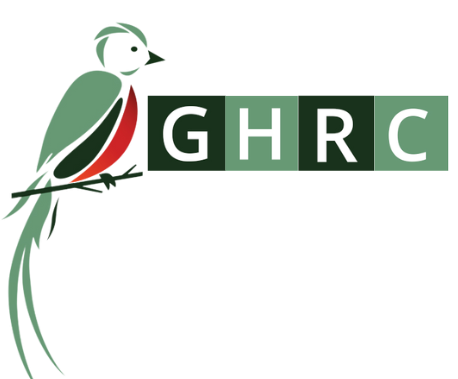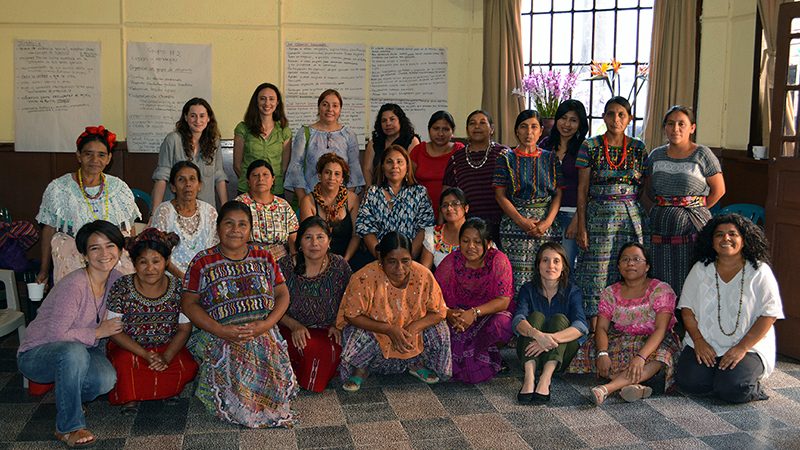Support La Puya: Tell KCA to Suspend Illegal Operations at the El Tambor Mine
(This petition has been closed, but can be viewed here.)
In July 2015, a Guatemalan court ruled in favor of members of the peaceful resistance movement La Puya, ordering EXMINGUA — a subsidiary of US mining company Kappes, Cassiday & Associates (KCA) — to suspend all construction activities at the mine until a community consultation is held and residents approve the project. The court also ordered the Municipal Council of San Pedro Ayampuc to take action to ensure any construction is stopped within the next 15 days.
According to the ruling, the company has been operating illegally, “without permit, authorization or approval from the Municipality of San Pedro Ayampuc … to carry out its mining project.”
GHRC delivered our petition to Daniel Kappes, president of KCA.
Call for Immediate Investigation into Killings of Indigenous Activists
(Click here to view our letter to Guatemala’s Attorney General)
Over the last few months, indigenous activists in northern Huehuetenango have experienced a series of threats, criminalization and attacks for their defense of indigenous rights and their opposition to hydroelectric dams and other large-scale projects planned for the region.
20-year old Pascual Basilio Pascual Diego was seriously injured in Santa Eulalia on January 20, 2015, and died in mid-March due to his injuries.
Then, Pascual Pablo Francisco, an active member of the community in Santa Cruz Barillas, went missing on March 24 and was found dead three days later. These deaths have occurred in a general context of vulnerability for indigenous communities in the region.
Tell Secretary Kerry: No US Funds to the Guatemalan Army!
(This petition has been closed, but can be viewed here.)
Guatemala’s UN Truth Commission report not only attributes 93% of all human rights violations and acts of violence to the Guatemalan State, which included over 600 massacres, it also finds the US responsible for playing a large role in providing military assistance and training to the Guatemalan army during the conflict. It was not until 1990, seven years after the most violent years of Guatemala’s internal armed conflict, that the US enacted a full ban on Department of State aid to the Guatemalan Army. Over the past two decades, restrictions on the ban have been weakened. Now, we face the possibility of seeing the restrictions lifted completely.
Currently, State Department funds may only go to the Guatemalan Army if the Secretary of State certifies that the Army:
1. Has a narrowly defined mission focused on border security and external threats, and a credible plan to end the army’s involvement in internal law enforcement.
2. Cooperates with civilian investigations and prosecutions of human rights cases involving current and retired military officers.
3. Publicly discloses all military archival documents related to the internal armed conflict in a timely manner in response to requests by civilian judicial authorities.
In addition, this year, the US Congress approved special conditions for reinstatement of aid, contingent upon the Guatemalan government taking credible steps toward implementing the 2010 reparations plan for the communities affected by the Chixoy Hydroelectric Dam. Over 3,000 people were affected by the dam, including 444 people massacred and several communities completely inundated when the dam was built in the early 1980s.
Given that conditions have not been met in a credible, concrete, and meaningful way, the State Department should not certify funding for the Guatemalan Army.
Stand in Solidarity with La Puya!
After more than two years of peaceful resistance to a gold mine, and repeated calls for dialogue, the communities in resistance of La Puya were violently evicted from the entrance to the project on Friday, May 23. Hundreds of police used tear gas and flash bombs to remove the women who formed the front lines of the resistance. Over twenty people were injured.
But the brave men and women of La Puya are not backing down. They continue to oppose the project and have received overwhelming support from national and international organizations and individuals in solidarity with their struggle in defense of water, life and community wellbeing.
US engineering firm Kappes, Cassiday & Associates (KCA) and Canadian mining company Radius Gold are the principal investors in the project.
Join GHRC, NISGUA and MiningWatch Canada in taking action: Urge KCA and Radius Gold to respect the dialogue process between the Guatemalan government and the communities of La Puya by halting all mining activities, and to cease any pressure on Guatemalan authorities to use violent force against the protesters.
End the War on Drugs in Mexico and Central America
(Click here to see out message to the US Congress and President Barack Obama)
 Mexico and Central America face extreme levels of violence since the war on drugs was intensified in the region. The rule of law has deteriorated as a result of the battles between drug cartels with the involvement of often corrupt state security forces. The use of torture, violence against women, human rights violations and extrajudicial executions have risen since US policies began to support a militarized approach to combating drug trafficking in the region.
Mexico and Central America face extreme levels of violence since the war on drugs was intensified in the region. The rule of law has deteriorated as a result of the battles between drug cartels with the involvement of often corrupt state security forces. The use of torture, violence against women, human rights violations and extrajudicial executions have risen since US policies began to support a militarized approach to combating drug trafficking in the region.
Relatives who have lost loved ones in the drug war have traveled throughout the United States to plead for an end to the US-backed war. In Central America, militarization under the pretext of the war on drugs has led to persecution of indigenous and grassroots leaders, human rights violations, illegal land grabs and extra-judicial executions, too often at the hands of the very forces funded under US aid programs.
By every conceivable measure (reducing availability of drugs, decreasing crime and the power of drug cartels, increasing public security, effective use of taxes), the “war on drugs” in Mexico and Central America has been an abject and costly failure.
As we take a close look at budget priorities, we need a bipartisan effort in Congress to carry out a fact-based evaluation and seriously rethink the war on drugs. It is time to put human rights and well-being first and rechannel drug war aid to programs for drug abuse prevention and treatment, reduction of arms trafficking, prosecution of money-laundering and drug policy reform within the United States.
Sign Our Letter of Solidarity with ‘La Puya’ / Alcemos la voz en solidaridad con ‘La Puya’
(ENGLISH): Click here to see our letter of solidarity with members of ‘La Puya’: Guatemalan environmental justice movement celebrates two years of resistance
Those who defend their rights are brave. Those who are willing to put their life on the line to defend the rights of others are heroes.
On March 2, 2012 courageous men and women from the communities of San Jose del Golfo and San Pedro Ayumpuc joined together in opposition to the construction of a gold mine near to their homes. Their concern is that the US-owned mining operation will negatively impact the air and water, damage crops and affect the health of their families and neighbors.
In their struggle to defend the environment and human rights, members have embraced one guiding principle above all others: a wholehearted commitment to nonviolence.
When pro-mining agitators — controlled by two former military officials — hurled insults at them, the members of the resistance responded by passionately intoning the national anthem. When hundreds of riot police arrived to violently evict them, the women of the resistance lay down on the ground and sang religious hymns. When gunmen tried to murder community leader Yolanda Oquelí, she and the others strengthened their commitment to the struggle. To each insult, threat, and physical attack, La Puya has responded with music, prayer, and mutual solidarity. As one community leader affirmed: “if any blood is spilled here, it will be ours. That is how deeply we believe in nonviolence.”
On March 2, 2014 the community resistance of La Puya will celebrate its second anniversary. While their cause is just, and their victories have been many, their struggle is still ongoing. Please join us in congratulating the men, women and children of La Puya for their inspirational dedication to the nonviolent defense of human rights!
Las personas que defienden sus derechos son valientes. Las personas que están dispuestas a arriesgar hasta la vida en defensa de los derechos de todos, son héroes.
El 2 de marzo de 2012, mujeres y hombres comprometidos de las comunidades de San José del Golfo y San Pedro Ayampuc, se unieron en oposición a la construcción de una mina de oro cerca de sus hogares. Su preocupación es que la mina, de una empresa estadounidense, tendría un impacto negativo sobre el agua y aire, dañaría sus siembras y afectaría la salud de sus familias y sus vecinos.
En su lucha para defender el medio ambiente y los derechos humanos, la resistencia de La Puya, ha adoptado un principio fundamental: un compromiso absoluto con la no-violencia. Compromiso que ha sido puesto a prueba varias veces.
Cuando agitadores pro-mineros –dirigidos por dos ex-militares—trataron de intimidar a la resistencia insultándolos, los comunitarios contestaron entonando el himno nacional con orgullo. Cuando cientos de antimotines llegaron para desalojar a la resistencia, las mujeres se tiraron al suelo, cantaron canciones religiosas y oraron. Cuando hombres armados intentaron asesinar a la lideresa Yolanda Oquelí, ella y los demás profundizaron aun más su compromiso de lucha. A cada insulto, amenaza y ataque, La Puya ha respondido con música, oraciones y la solidaridad mutua. Afirmó un líder comunitario: “si aquí hay sangre derramada, será la nuestra. Es así de profundo nuestro compromiso con la no-violencia”.
El 2 de marzo de 2014 la resistencia de la Puya celebrará su segundo aniversario. Aunque su causa es justa, y sus victorias son notables, la lucha continua. Por favor, unan su voz con la nuestra para felicitar a los hombres, mujeres y jóvenes de La Puya, quienes son héroes por su dedicación a la defensa no-violenta de los derechos humanos!
Denounce the Massacre in Nacahuil
(View our letter to the Government of Guatemala)
The town of Nacahuil sits only an hour from Guatemala City, yet it has been largely spared the high rates of violence that have plagued Guatemala’s capital in recent years. That all changed last Saturday.
At around 11pm on September 7, unidentified men stalked through the town of about 7,500, gunning people down. When they finally fled in their stolen vehicle, 11 people were dead and at least another dozen were injured.
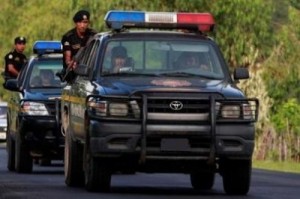
Relatives of those killed in the attack suspect police involvement in the crime. This is based on witness accounts that police arrived 20-30 minutes before the shooting, passing through the same part of town where most of the victims were killed. The owner of a local bar was among the dead and a relative alleges that the police demanded a bribe from the owner, which he refused to pay.
San José Nacahuil is a Maya Kaqchikel community in the municipality of San Pedro Ayampuc. The town has a community police force and has successfully maintained peace and security without outside support. Residents expelled the national police six years ago, and local officials say that they have seen a reduction in crime since that time.
Interior Minister López Bonilla immediately blamed the attack on gangs and placed the community under the control of a special contingent of police and soldiers. Community authorities of San José Nacahuil, as well as other indigenous and grassroots organizations, have criticized Bonilla for attributing the crime to gangs without first undertaking an investigation, and they demanded that the police and military be removed from the community. Instead, the Interior Minister has asked President Otto Pérez Molina to install a military detachment in the communty.
Like many indigenous communities in Guatemala, the people of Nacahuil have suffered attempts to impose development projects without their consent. In response, many members of Nacahuil have participated in non-violent resistance movements, such as the ongoing peaceful road block at “La Puya” in the neighboring municipality of San José de Golfo to prevent the construction of the El Tambor gold mine. Anti-mining activists have expressed concern that the violent incident will be used by the government as an excuse to militarize the region or crack down on protesters.
La Puya is Under Threat Again
On December 7th, the communities in resistance to mining in San José del Golfo and San Pedro Ayampuc held their ground at the roadblock they have maintained since March of this year as the police attempted to forcefully evict them.
At 6am, anti-riot police arrived at the roadblock in San Jose del Golfo and began tearing down the banners and other installations. They also arrested at least 5 people for supposedly obstructing the road, though the protesters have only been blocking the entrance of mining equipment, not other traffic. A lawyer for the Ministry of the Interior also threatened Yolanda Oqueli, who was shot by unknown assailants earlier this year, with arrest.
| Police shot tear gas at the protesters, which include children and men and women of all ages. Several people, including two young girls, were treated for tear gas exposure. Despite this aggression, the peaceful protesters held their ground. They laid down on the street with makeshift masks covering their faces, and sang hymns to give themselves courage. Meanwhile, the police tore apart the temporary kitchen the protesters have been using to feed themselves, and stole food and water. (Photo: Prensa Libre) |
The Office of the Human Rights Ombudsman, suggested opening a dialogue between the protesters and the government, but the government rejected the idea. Interior Minister Lopez Bonilla was quoted as saying that there could well be more arrests, and that the police would keep using force if need be to open access for the mining company.
Attorney Sergio Vives explains that the actions of the police are illegal, as there is no order for the eviction of the communities.
Help Communities in Rio Negro Achieve Justice
For more than 20 years, the Maya Achi people of Río Negro, Guatemala have sought justice for the massacre of their husbands, wives and children that took place during Guatemala’s civil war in the early 1980s. Now, all 33 communities severely impacted by construction of Chixoy need our help to achieve reparations from the government of Guatemala, the Word Bank and the Inter-American Development Bank. Thank you for joining GHRC, International Rivers and Rights Action in taking a stand to support the communities.
Demand Justice for the Massacre in Totonicapán, Guatemala
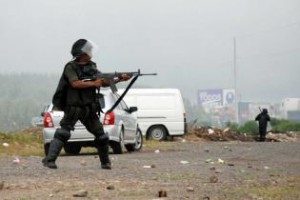 On October 4, 2012, Maya K’iche’ communities carried out a peaceful protest organized by the Alcaldía Indígena (Indigenous authority) of the 48 Cantones of Totonicapán, in regions of Alaska, Xecanchavox and Cuatro Caminos in the highlands in Guatemala. The protesters gathered to oppose the recent hikes in the price of electricity, reforms to teacher training and certification, and the proposed constitutional reforms recently put forward by the Government.
On October 4, 2012, Maya K’iche’ communities carried out a peaceful protest organized by the Alcaldía Indígena (Indigenous authority) of the 48 Cantones of Totonicapán, in regions of Alaska, Xecanchavox and Cuatro Caminos in the highlands in Guatemala. The protesters gathered to oppose the recent hikes in the price of electricity, reforms to teacher training and certification, and the proposed constitutional reforms recently put forward by the Government.
During the demonstration, Guatemalan Military and National Civil Police forces appeared at the protest and shot indiscriminately at the demonstrators, leaving 8 dead and over 35 people wounded. With the pain of the recent genocide still fresh in the historic memory of indigenous communities, it is extremely concerning that acts of state violence are once again taking place in Guatemala against indigenous people who seek to exercise their legitimate rights to free speech and peaceful protest.
Denounce Attack Against Anti-Mining Activist Yoli Oqueli
June 2012
 On June 13th, at approximately 6:30pm, Yoli was ambushed by two men on a motorcycle while driving to her home in San José del Golfo. She was shot at repeatedly; one bullet struck her in the abdomen above her right kidney. Yoli has been a vocal and passionate opponent of the proposed mine in the communities of San Jose del Golfo and San Pedro Ayampuc. Her inspiring leadership is just one example of the coordinated efforts of men, women and children in these communities to say “NO” to mining and its potentially devastating effects on local drinking water, farming land and the environment in general. Take Action to call on the Guatemalan Government to investigate this crime and prosecute those responsible.
On June 13th, at approximately 6:30pm, Yoli was ambushed by two men on a motorcycle while driving to her home in San José del Golfo. She was shot at repeatedly; one bullet struck her in the abdomen above her right kidney. Yoli has been a vocal and passionate opponent of the proposed mine in the communities of San Jose del Golfo and San Pedro Ayampuc. Her inspiring leadership is just one example of the coordinated efforts of men, women and children in these communities to say “NO” to mining and its potentially devastating effects on local drinking water, farming land and the environment in general. Take Action to call on the Guatemalan Government to investigate this crime and prosecute those responsible.
Denounce Closure of the Guatemalan Peace Archives
June 2012
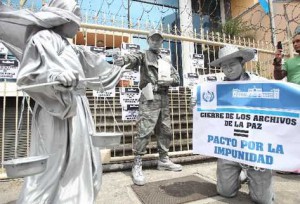 The work of the Peace Archives Directorate (Dirección de los Archivos de la Paz, DAP) has been integral to ongoing efforts to institutionalize the peace process, and has contributed greatly to the public’s access to truth, historic memory, and the struggle to end impunity for crimes of the past. Call on the Guatemalan government to strengthen, not weaken, the Peace Archives Directorate and to respect its role in promoting a successful transitional justice process.
The work of the Peace Archives Directorate (Dirección de los Archivos de la Paz, DAP) has been integral to ongoing efforts to institutionalize the peace process, and has contributed greatly to the public’s access to truth, historic memory, and the struggle to end impunity for crimes of the past. Call on the Guatemalan government to strengthen, not weaken, the Peace Archives Directorate and to respect its role in promoting a successful transitional justice process.
[Photo Credit: La Prensa]
Tell Congress that now is not the time to lift the ban on funding to the Guatemalan Army!
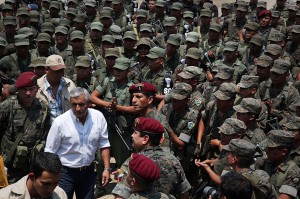
The ban stands as a symbol of US commitment to human rights in Guatemala, and lifting the ban now sends the wrong message. The military has not cooperated with investigations of human rights violations from the internal conflict. Meanwhile, the army’s role in citizen security is rapidly expanding. In addition, there is serious concern that assistance to the Guatemalan army will end up in the hands of the cartels it is supposedly combating. The US Congress must continue to pressure the Guatemalan government to respect human rights before giving any funding to the army.
[Photo Credit: Plaza Publica]
Call Campaign to the White House
December 2011
US Lawyer and human rights activist Jennifer Harbury has been pushing for justice in war crimes cases in Guatemala for over 20 years. She wrote from Guatemala, calling for action at this key moment to denounce the Guatemalan military’s attempts to impede the work of Attorney General Claudia Paz and the judicial proceedings underway in key cases. Within the next few weeks it is very likely that the army officers facing war crimes charges will push through a de facto amnesty, either by removing Claudia Paz, the amazing attorney general, an illegal congressional amnesty (“punto final”), or through a court ruling canceling international human rights law. You can add your name here.
Evictions, Violence, Hunger and Death in the Polochic Valley
October 2011
Maya Q’eqchi’ families in Guatemala’s Polochic Valley faced the imminent threat of starvation, sickness, and violence as the result of a series of violent -even deadly- land evictions instigated by the Chabil Utzaj sugar company, with the support and participation of the Guatemalan government. The communities watched as their crops were destroyed and houses burned.
On June 20th the Inter-American Commission on Human Rights (IACHR) issued precautionary measures (medidas cautelares) requesting that the Guatemalan government take steps to assure the health, safety and physical well being of the evicted indigenous farming communities. 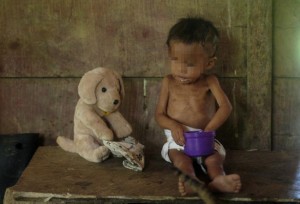
Wendy (pictured above) from one of the evicted communities, is almost 3 years old and weighs only 13 lbs. She has lost one eye and if she survives, will likely be completely blind and suffer from mental retardation from malnutrition.
The Guatemalan government’s response has been woefully inadequate. The Presidential Human Rights Commission (COPREDEH), the state institution charged with implementing the measures, has responded with appalling indifference to the desperate plight of the families. Instead of complying with its role as a human rights organization, COPREDEH has assumed an attitude of confrontation toward the communities and their representatives.
